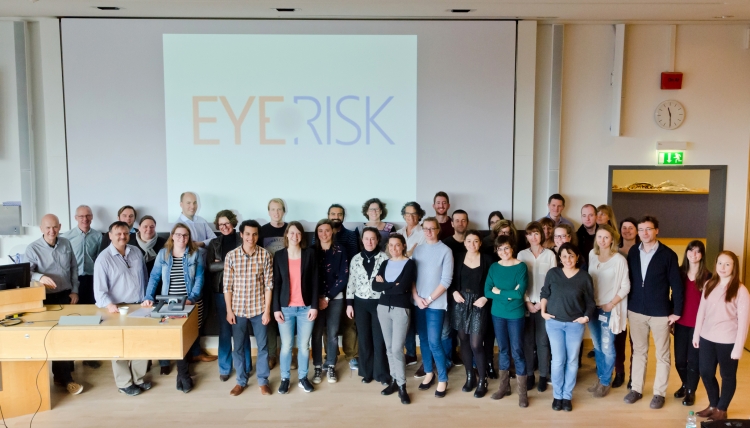EYE-RISK creates sub-programmes for progressing with the study of AMD

The Barcelona Macula Foundation team took part in the 5th EYE-RISK Consortium Meeting, the fifth Meeting of the European EYE-RISK Project. Dr. Jordi Monés, the BMF’s Medical Director, together with Anna Borrell, Dr. Marc Biarnés, Dr. Lucía Ferraro and Eduardo Rodríguez, travelled to Tübingen (Germany) to examine the state of the project with the assistance of the leaders of its Work Packages (WPs). They also shared the recent developments generated by all the members and programmed the work to be undertaken over the coming months.
One of the Meeting’s new features was the creation of various discussion sub-groups to highlight specific topics that are of prime importance to EYE-RISK and then to integrate the information obtained from each into the project. The choice of cellular and animal models, the analysis of biomarkers and lipids, statistical models and the correct interpretation of images were the principal topics for these sessions, which were attended by the BMF.
The meeting addressed issues such as the choice of cellular and animal models, the analysis of biomarkers and lipids, statistical models and the correct interpretation of images
In one of his contributions, Dr. Monés informed the project members of the imminent publication of two scientific articles created by the BMF within the framework of EYE-RISK. The aim is to cast more light on the research into blindness being undertaken by the various centres involved in the project.
The Fifth Meeting of EYE-RISK (Exploring the combined role of genetic and non-genetic factors for developing AMD: a systems level analysis of disease subgroups, risk factors and pathways) took place on 16-17 February in Tübingen at the Institute for Ophthalmic Research of the German members, Eberhard Karls Universität Tübingen (EKUT). This is a new research centre that forms part of Tübingen’s biomedical and neuroscientific campus and fosters the creativity to generate innovative ideas, their transfer to reality and their translation into the diagnosis and therapy that helps those who suffer vision loss.

EYE-RISK is funded by the European Union’s Horizon 2020 Research and Innovation Programme under Grant Agreement 634479.